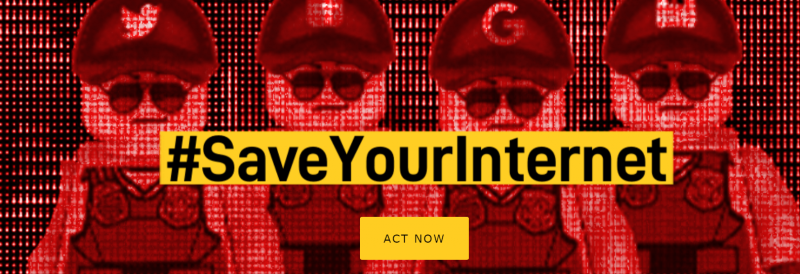In its current form, the proposed EU Directive for Copyright in the Digital Single Market – which includes Article 11 and Article 17 (previously numbered Article13) – represents a threat to the internet as we know it. The proposals were subject to a vote in the European Parliament in July, giving MEPs the chance to vote against the proposal, and fundamentally fix this Directive. They voted against rubber-stamping the proposals and therefore will reform, amend, and voted on various aspects of the Directive in the second week of September.
All 751 MEPS got a chance to shape the European copyright reform with a plenary vote. 366 MEPs ignored calls asking them to #SaveYourInternet, as they adopted the copyright #CensorshipMachine. A guide from EDRi on the process is here and #SaveYourInternet outline actions going forward and how we can still win here.
As PR and communications practitioners, we believe Article 11 and Article 17 (previously numbered Article13) are so damaging to the internet, freedom, and the digital economy that an evidence-based approach requires MEPs to scrap them entirely.
Summary and actions
What is it? The EU Directive for Copyright in the Digital Single Market: a threat to the internet.
What is Article 11? It will introduce a “link tax” and require online platforms (such as Twitter and Facebook) to pay for linking to, or quoting from, news and content.
What is Article 17 (previously numbered Article 13)? It will introduce “censorship machines” to prevent those online platforms sharing content which is copyrighted.
What are we doing? Having fought and won a major copyright case in the Court of Justice of the European Union, and as one of the long-term supporters of OpenMedia’s Save The Link campaign, we know copyright disproportionately impacts our industry and that PR and communications practitioners need to understand (and act upon) the very clear risks to our industry. The campaign to halt the rubber-stamping of the Directive in July 2018 was successful.
When is this happening? The European Parliament plenary voted against the mandate to start negotiations with Council and the European Parliament did not remove these Articles at the plenary in September 2018.
What is the most effective action? Support the #SaveYourInternet campaign by clicking below. "Trilogue negotiations" (between the JURI Committee Rapporteur, representatives of the EU Member States (Council), and the European Commission (EC)) are took place between January and February 2019 before a final vote of MEPs. With the Council having voted in favour of the EU Copyright Directive, MEPs can still #SaveYourInternet.
The European Parliament will vote from 12:30 CET on Tuesday, 26th March, 2019. The full details are here and the live-stream is here.
PR and communications-specific concerns
- PR and communication and journalism are in a positive-sum, symbiotic relationship when it comes to news and content creation. While the intention is to support organisations which produce news, ultimately this will hamstring aggregating websites and applications and drastically reduce the public's ability to engage properly with news and content. This has the obvious unintended consequence of reducing sharing on social media.
- Lobbyists for the proposals have previously contacted MEPs stating that the "systematic scraping of content […] in commercial services together with hyperlinks for commercial gain is not equivalent to the activities of individuals browsing the web and posting links to things they are interested in” and therefore attempt to create the impression that there is a distinction, on social media, between individuals and “commercial services”. Much like our work on the NLA (and our CJEU victory), attempts to draw about these distinctions inevitably lead to our industry being disproportionately targeted to prioritise right-holders over internet users.
- The remit of the proposal extends beyond search engines and commercial use and could result, in the future, in individuals and businesses being charged to share hyperlinks: this has serious ramifications for practitioners who are, for example, sharing hyperlinks to favourable recent coverage.
Press release (September 2018) - EU Copyright Directive: "There is still a chance to save the internet as we know it"
Responding to the European Parliament’s vote in favour of the Copyright Directive – with amended versions of Article 11 (the “link tax”) and Article 13 (“upload filters”) – the PRCA has criticised the move and called on MEPs to reject these Articles at the final vote in spring.
Francis Ingham MPRCA, Director General, PRCA, said: “As the PR and communications industry knows, the link tax and upload filters threaten the core principle of access to information.
“The supposedly-good intentions simply do not add up: this represents an odd and misguided attempt to regulate the internet in a way that is as detrimental to practitioners as it is to the public.
“While the intention is to support organisations which produce news, ultimately this will hamstring aggregating websites and applications and drastically reduce the public's ability to engage properly with news and content. This comes, ironically, at a time when we need the public to engage with the news more than ever.
“The European Parliament vote was close, just as it was in July. While today is a major set-back, not all hope is lost: there is still a chance to save the internet as we know it at the final vote in spring."

